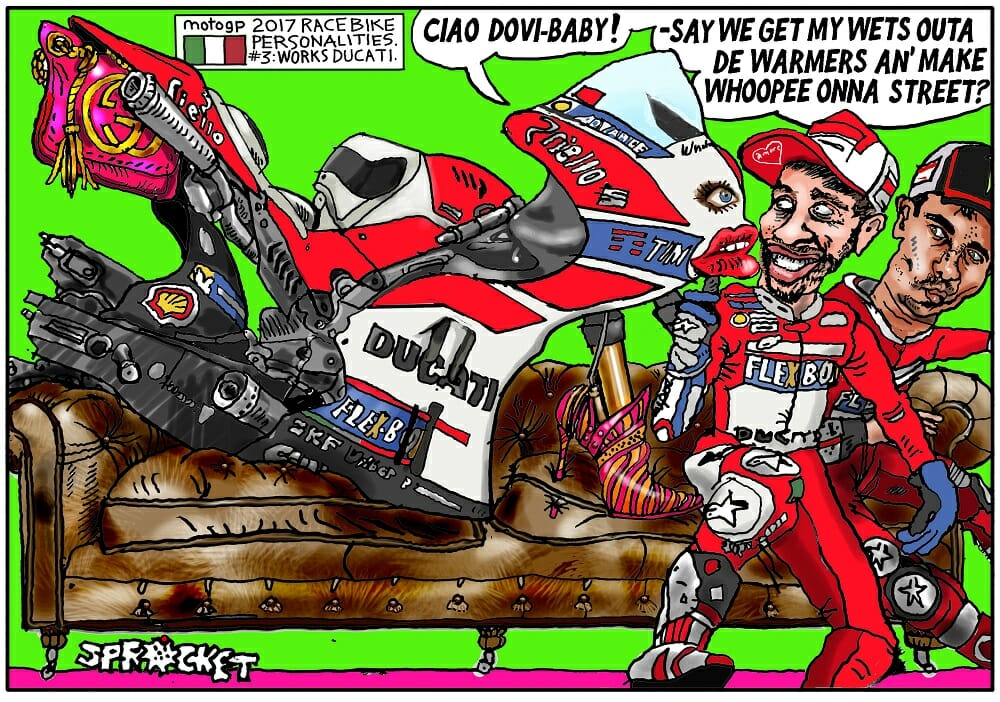Michael Scott | April 25, 2017
There is a tradition in engineering that goes back far into the days of tall ships under masts and canvas, and continued unabated through the age of steam into modern times. Vehicles are feminine.
I wonder if the same rules apply in our modern, liberated and politically correct times? I wonder if it is safe, or even appropriate, to continue the sexist analogy?
Actually I don’t wonder. Of course they are still feminine. Especially motorcycles.
Especially to anyone who has ever pushed one up a long hill, only to discover that he (or indeed she) had failed to switch on the fuel tap.

Of course racing bikes don’t have fuel taps, and they are a feisty breed of female. But that doesn’t make them any the less feminine. And what a variety of fems they are in 2017, ever since the great dancing master Carmelo Ezpeleta decreed that they should all have access to the same tutus and dancing shoes.
Making the bikes more equal has only underlined their different personalities.
Two races in, and Maverick Vinales has won both of them—the first Yamaha rider to do so since Wayne Rainey in 1990.
He has shown himself to be the perfect leading man, sensitively shepherding his M1 through the complicated dance steps required. Not surprising to those of us who have followed his career path in detail. And fitting also, considering his looks and background not a million miles from the roots of the tango.
But what of his partner?
The elegant M1 has responded to his commands, which have been both gentlemanly and masterful, with perfect decorum and femininity. She is well aware of her own strengths, but she also clearly understands the value of an equal partnership. Behind every man, there stands a good woman. And of course vice versa.
The Yamaha has always been a compliant companion, willing to cooperate for the greater good. This was true in the shrill two-stroke years, and remained so into the gruffer times of the cross-plane crankshaft four-stroke.
The Honda, by contrast, has a quite different personality. Brash, confident, even arrogant—this femme fatale is well aware of her own power, and an ardent feminist. Men are useful only for operating the controls. But they had better be careful which buttons they press.
The Honda has never been averse to tossing her dancing partner skywards, in full public view, even if it is to her own ultimate detriment. They get what she thinks they deserve, and hang the consequences.
Continue the analogy, and we have the Suzuki: pretty—even delicate, modest and rather self-effacing, but with a surprising backbone when she is called upon to show it.
Then the Aprilia—once a loudmouthed bag of trouble, back in the long-ago days of the three-cylinder Cube, but nowadays rather different: of honest peasant stock, ready to get on with the job as a solid all-rounder.
The KTM seems also to have similar characteristics, a matter-of-fact Austrian fraulein whose potential dancing skills belie her thick ankles.
Not to mention the operatic prima donna of the tracks, the proud Bologna beauty badged Ducati. A lady to both fear and admire. As if one could do anything else.
I have some high-level support in these fancies. I recall Rossi telling me, before his own dreadful dance macabre with the Desmosedici, of his own feelings towards his bikes. He spoke to them late at night in the garage, he confessed, and they would speak back. The Honda, he said, had been proud and aloof. But the Yamaha—“she is more shy.”
One doesn’t want to carry these analogies too far, but there is truth in them all the same. Machines do have personalities. But they are still machines—an M1 is only a motorcycle. As are all the rest. Just tools, to get a job done.
Personality comes because they are designed and built by humans. They carry the genes of their originators. Or at least that is the perception. And it is a perception that the factories do well to encourage.
This is one reason why racing is such a valuable marketing tool. It suggests the personality of the company making the bikes they want you to buy. Thus Yamaha comprises nice sensible people, with whom it would be comfortable to go forward. Honda offers different strengths and attracts a different sort of customer.
And so on. All the way to the impossibly glamorous and potentially ruinous Ducati.
Yet, being female, the company products are almost by definition capricious, unpredictable, and delightfully varied. You can get a polite and submissive Honda just as you can get a fiercely aggressive Suzuki. Just remember the road version of the RG500: the only true replica of a two-stroke racing bike.
Just don’t tell Valentino. CN